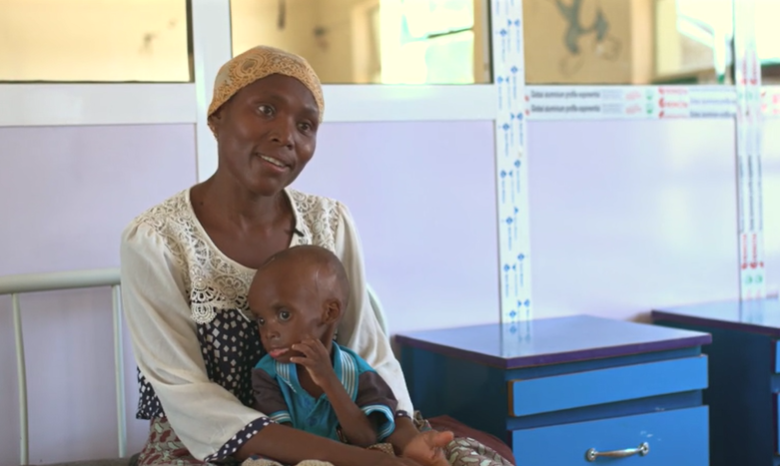Rising Malnutrition in Lake Chad Region Amid Climate Change, Conflict – ICRC
The International Committee of the Red Cross (ICRC) reports a 24 per cent rise in malnutrition among young children over the past year in North East Nigeria, a troubling indicator of worsening food insecurity as families in the Lake Chad region grapple with the combined effects of conflict and climate change.

Food insecurity in northeastern Nigeria has reached alarming levels, with severe malnutrition rates surging as communities battle the devastating effects of climate change and ongoing conflict.
In a statement on Tuesday, the International Committee of the Red Cross (ICRC) reports a 24 per cent increase in malnutrition cases at its supported healthcare facilities, with young children most affected, highlighting the increasing struggle of families in the Lake Chad region to access adequate food.
The northeastern states, which rely heavily on subsistence farming, have been hit hard by irregular rainfall, prolonged droughts, and the recent devastating floods. This has resulted in failed harvests, leaving millions of families without food, and worsened the humanitarian crises in the region.
The ICRC report indicates that humanitarian agencies estimate that 6.1 million people in the Lake Chad region, including Nigeria’s northeast, are facing food shortages in the coming months. This is the highest figure in four years.
In Mubi, Adamawa state, where the ICRC has been providing clinical care and therapeutic food to malnourished children, such as Rabiatu Jibrilla’s two-year-old son, the crisis is observable. “When I brought him here, he couldn’t even sit on his own. His stomach was flat as if he had no intestines,” said Rabiatu in the report.
The long-standing armed conflict has displaced millions and destroyed livelihoods across Nigeria’s northeast. As violence disrupts access to farmland and forces farmers to abandon their fields, food production has significantly declined, further aggravating hunger.
The convergence of climate change and conflict has significantly disrupted regional food production. Armed groups continue to seize farmlands and restrict access to agricultural areas, exacerbating the already dire situation.
“We do not have enough farmland. Before, we used to go out in the fields to farm, but now, the armed groups have taken over the bush. Nobody can go to the bush to farm,” said John Paul Ezra, a farmer from Madagali village in Adamawa state. Like many in the region, Ezra’s livelihood depends heavily on subsistence farming, making him and others vulnerable to the destructive effects of climate change.
This year’s harvest season, already strained by drought, was further devastated by heavy flooding that swept away seeds and crushed hopes for a successful yield. Farmers like Abubakar Bello Duhu from Kwata Kwamla village in Adamawa state are bearing the brunt of this dual crisis. “People have fainted and are in the hospital. Others have died because there isn’t enough to eat,” he said.
The situation is particularly dire for vulnerable populations, such as women and children, who bear the brunt of food shortages and malnutrition. In response, the ICRC, in collaboration with national Red Cross societies and local authorities, has ramped up efforts to distribute emergency cash, seeds, and tools to support farmers. Livestock vaccination programs have also been initiated in an attempt to preserve livelihoods. Despite these interventions, the humanitarian response faces overwhelming challenges.
“We are trying to strengthen our support, but the needs are way beyond what we can achieve,” said Francesca Piccin, head of the ICRC sub-delegation in Mubi, Nigeria. The organisation has also consistently reminded the conflict parties of their obligations under international humanitarian law, emphasising the need to ensure access to essential means of survival and humanitarian aid.
The combined forces of climate change and conflict have created a devastating cycle of food insecurity in Northeast Nigeria. With millions at risk, urgent international attention and action are needed to avert further regional disaster.
Food insecurity in northeastern Nigeria has intensified due to climate change and ongoing conflict, leading to a significant rise in malnutrition rates, especially among young children. The International Committee of the Red Cross (ICRC) reports a 24% increase in malnutrition cases, as millions face impending food shortages, with current figures being the highest in four years.
Irregular rainfall, prolonged droughts, and devastating floods have severely disrupted subsistence farming, causing failed harvests and exacerbating the humanitarian crisis. Armed conflicts further hinder access to farmlands, reducing food production and deepening the hunger crisis. Vulnerable populations, particularly women and children, are the most affected by these challenges.
The ICRC and other humanitarian organizations are intensifying efforts to provide emergency relief through cash, seeds, farming tools, and livestock vaccination programs. Despite these efforts, the needs surpass the resources available, and urgent international intervention is necessary to prevent further deterioration of the situation.
Support Our Journalism
There are millions of ordinary people affected by conflict in Africa whose stories are missing in the mainstream media. HumAngle is determined to tell those challenging and under-reported stories, hoping that the people impacted by these conflicts will find the safety and security they deserve.
To ensure that we continue to provide public service coverage, we have a small favour to ask you. We want you to be part of our journalistic endeavour by contributing a token to us.
Your donation will further promote a robust, free, and independent media.
Donate HereStay Closer To The Stories That Matter




